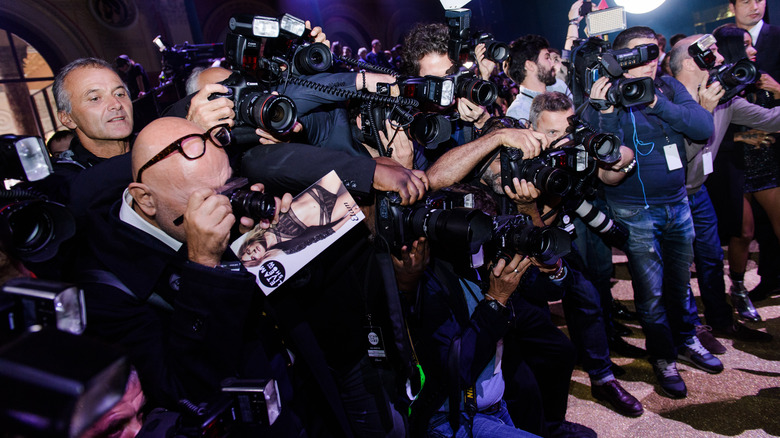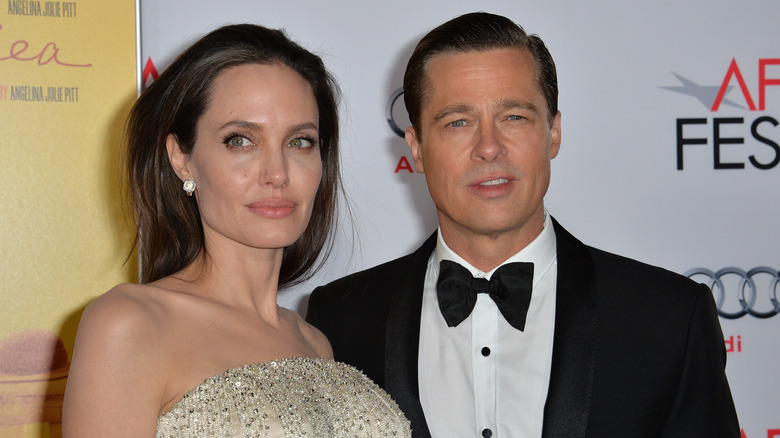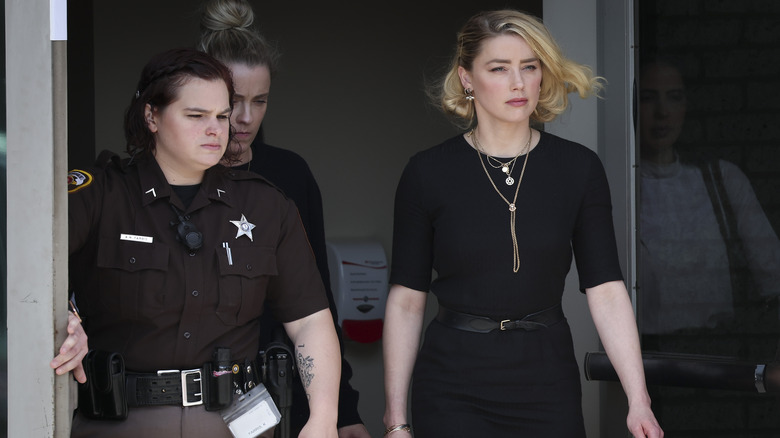It's Time To Confront Fan Culture's Deeply Embedded Misogyny
Strong fan reactions to celebrity couples are nothing new. But if the response to a viral video of Harry Styles and Emily Ratajkowski kissing in Tokyo says anything about the state of fan culture, it is that it deserves scrutiny. Following the video's appearance online, fans of the singer expressed amusement, shock, and rage over the thought of Ratajkowski being romantically linked to their idol. Under one post featuring the infamous smooch, Twitter user wrote, "Ugh. She's the most annoying person in the world. WTH is he thinking."
Although jealousy and protectiveness over a famous heartthrob can be totally normal, preoccupation with celebrity relationships can easily veer into unhealthy obsession. Speaking to Glamour, author Kaitlyn Tiffany shared that unfortunately, when a fandom feels they are owed power over a celebrity's decision-making, its often leads to some unkind, unsolicited statements about the celebrity's partners. However there's one element missing from the conversation: Why is it always women partners being criticized?
A look at fan history on the internet reveals larger pattern of misogyny within in fan communities that has been ongoing for years. Back in 2011, singer Selena Gomez opened up in a radio interview about being attacked by Justin Bieber fans while she was dating the pop star (via CTV News). Ratajkowski also isn't the first woman to be publicly insulted for simply being associated with Styles. The British singer's former partner, Olivia Wilde, opened up to Vanity Fair in 2022 about dealing with bullying from fans during the period when she was dating Styles, to the point where she had to limit her Instagram comments. And though it's easy to cast it off as rabid fan behavior, the glaring misogyny deserves some scrutiny.
Backlash toward women who date famous men reproduces the patriarchy
Per University of Chicago, law educator and feminist Mary Becker wrote over twenty years ago that both internalized and externalized misogyny valorizes men and subjugates women. Consequently, she argued, "In such a culture women are seen as less than fully human and as less than trustworthy...Aggression against women is justified by women's choices and natures." Amazingly, Becker's words are still relevant today and can even be applied to how celebrities' romantic relationships are perceived by the public. In the case of Harry Styles' relationships, fans worship the star and even baby him, but believe no partner will ever be good enough for him. Such misogyny stems from gender stereotypes and impossible expectations for women's appearances and behavior, regrettably serving society's patriarchal and sexist beliefs.
For fans, positioning a male star as a heartthrob also makes it so that celebrity is viewed as a dream partner who can do no wrong. This unfortunately gives way to misogynist thinking that pits women against each other under the assumption they are competing for that person's attention, regardless of their own level of success. Never mind that women such as Ratajkowski and Wilde are both successful in their own right. In fact, some outlets even painted Wilde as jealous of Ratajkowski following the kiss (via US Weekly). This line of thinking feeds into the patriarchal ideals described by Becker, where vitriol against women is normalized and seen as acceptable.
Fandom holds women to an unfair standard
Fan culture's tendency to valorize men creates a culture where women are unfairly held to a higher standard than men and blamed for all wrongdoing. Some may remember that following the Brad Pitt and Jennifer Aniston split in the early aughts, both fans and tabloids were quick to blame actress Angelina Jolie as responsible. As The Independent points out, Jolie was labeled "homewrecker," even though Pitt was also involved in their decision to become a couple.
The tearing down of women as a way to build up and protect men has dire consequences for society as a whole. For one, it reinforces a culture of slut-shaming and victim-blaming. That same misogyny exhibited in the Jolie-Pitt relationship can be seen in the fan response to Styles and Ratajkowski. Styles is valorized and can date around as much as he wants, but the women who date him are judged for merely associating with him.Some of Styles' fans have gone so far as to shame Ratajkowski' for dating around at all. In response to one repost of the viral kiss video, one Twitter user wrote, "She does get around doesn't she, wasn't she just topless in a post with a comedian?" while another said, "Is there a guy left in Hollywood that HASN'T run through @emrata? More traffic through that one...than a subway."
Fan culture's misogyny has dire consequences for women on a larger scale
When worshipping a male idol leads to verbal attacks on their female counterpart, there are repercussions that extend beyond causing personal offense. Take, for example, the Amber Heard and Johnny Depp defamation trial, during which Depp's fans supported his misogynist and violent insults launched at Heard and joined in with their own. Portrayed as a pathological liar who was emotionally and mentally unstable, Heard received harrowing threats from Depp's fandom, demonstrated in the #justiceforjohnny movement on TikTok. Meanwhile, Depp's calm demeanor and sex-symbol status overshadowed any of the grisly texts he had written about Heard that were read aloud in court. Depp didn't deny writing "I will f*** her burnt corpse afterward to make sure she's dead," but his fandom didn't seem to care and only found him endearing and humorous in his ramblings during the trial.
This whole event indeed was a big step backward for the #MeToo movement by portraying women who come forward with abuse as detestable, untrustworthy, and mentally unfit. It also demonstrated that if you are not a "perfect victim" – every little smirk or tear Heard shed was analyzed and criticized as fake by Depp's fandom – you won't get much sympathy or support. Such hateful and sexist comments made about women who gather the courage to share their stories of abuse only serve to perpetuate a victim-blaming society and stifle victims' voices.



